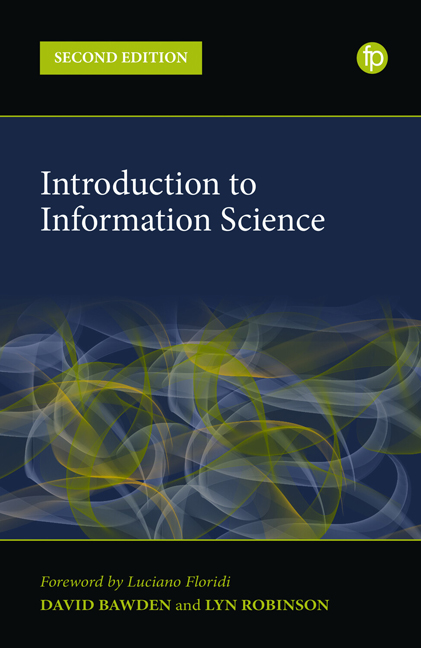Book contents
- Frontmatter
- Contents
- Figures
- Preface
- Foreword – Curators of Semantic Capital
- List of Acronyms
- 1 The Information Science Discipline
- 2 History of Information: the Story of Documents
- 3 Philosophies of Information
- 4 Paradigms, Turns and Theories in the Information Sciences
- 5 Information
- 6 Documents and Documentation
- 7 Domain Analysis
- 8 Information Organisation
- 9 Digital Technologies and Data Systems
- 10 Information Systems
- 11 Informetrics
- 12 Information Behaviour
- 13 Communicating Information: Changing Contexts
- 14 Information Management and Policy
- 15 Information Law and Ethics
- 16 Information Society
- 17 Digital (Onlife) Literacies
- 18 Research in the Information Sciences
- 19 The Future of the Information Sciences
- Additional Resources
- Index
3 - Philosophies of Information
Published online by Cambridge University Press: 21 April 2022
- Frontmatter
- Contents
- Figures
- Preface
- Foreword – Curators of Semantic Capital
- List of Acronyms
- 1 The Information Science Discipline
- 2 History of Information: the Story of Documents
- 3 Philosophies of Information
- 4 Paradigms, Turns and Theories in the Information Sciences
- 5 Information
- 6 Documents and Documentation
- 7 Domain Analysis
- 8 Information Organisation
- 9 Digital Technologies and Data Systems
- 10 Information Systems
- 11 Informetrics
- 12 Information Behaviour
- 13 Communicating Information: Changing Contexts
- 14 Information Management and Policy
- 15 Information Law and Ethics
- 16 Information Society
- 17 Digital (Onlife) Literacies
- 18 Research in the Information Sciences
- 19 The Future of the Information Sciences
- Additional Resources
- Index
Summary
Today, philosophy faces the challenge of providing a foundational treatment of the phenomena and the ideas underlying the information revolution, in order to foster our understanding and guide both the responsible construction of our society and the sustainable management of our natural and synthetic environments. In short, we need to develop a philosophy of information.
Luciano Floridi (2013, xii)The philosophy of information is congruent with library tradition. From Bliss and Danton's discussion in the 1930s, through Egan (without Shera), Nitecki, and Floridi, there stands a very definite genealogical line.
Ariel A. Morán-Reyes (2015, 587)Introduction
Topics at the core of the information sciences, such as the nature of knowledge and what we can know, how meaning and truth are ascertained, and how things can be distinguished, named, categorised, and classified, have been the concern of philosophy for many centuries. Yet information science has no agreed philosophy of its own; rather, a wide variety of philosophies and philosophers have been pressed into service to analyse its concerns. In this chapter we will look at some ways in which philosophy and information science overlap and interact, and how philosophical ideas may directly affect the theory and practice of the information disciplines. This is an extensive, and in some aspects technical, topic, and only a selective and informal overview will be given, with references to the literature for those wishing to take it further.
Philosophy and its relevance to information science
There are usually held to be three main branches of philosophy: ontology and metaphysics – what is it to ‘be’, and what kinds of things can exist; epistemology – what is it to ‘know’, what can we know, and how can we be sure of our knowledge; and ethics – how can actions be ‘right’, and how should we act. All of these have relevance to the information sciences; see Furner (2017a) for more detailed discussion. Metaphysics (the study of what can exist) and ontology (the study of fundamental categories and kinds of things) address the existence and nature of entities such as information, documents, relevance, aboutness and many more. Epistemology questions what is meant by knowledge, with very practical consequences for knowledge management. Ethics questions what is the right use of information, and touches on issues such as censorship and privacy. This is treated in detail in Chapter 15, and will not be repeated here.
- Type
- Chapter
- Information
- Introduction to Information Science , pp. 45 - 62Publisher: FacetPrint publication year: 2022

